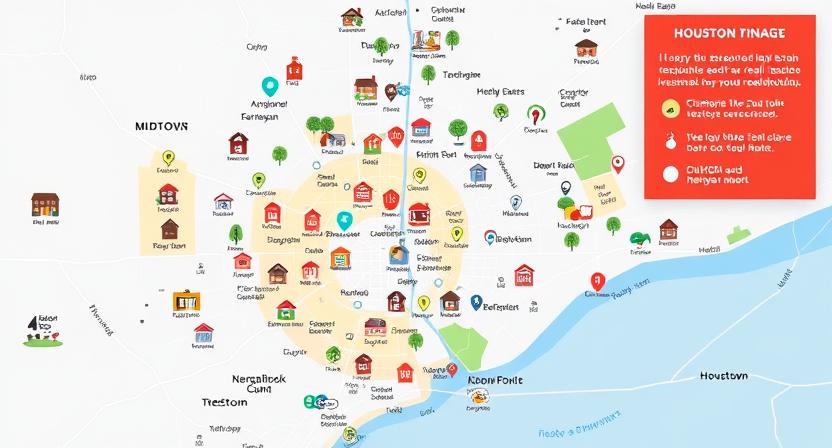How to Buy an Investment Property in Houston: A Complete Guide
One of the most vibrant real estate markets in the US is in Houston, Texas. Numerous investors are looking at chances in this dynamic city because of its diverse economy, expanding population, and high rental demand. Learning how to purchase an How to Buy an Investment Property in Houston might be a significant step toward your financial objectives if you’re hoping to increase your wealth through real estate.
Everything from market research to funding and legal considerations is covered in this extensive book. The parts that follow will guide you through each crucial stage, regardless of whether you’re an experienced investor or hoping to grow your portfolio.
Understanding Houston’s Real Estate Market
The real estate market in Houston is renowned for its diversity and tenacity. It provides a variety of investment options, including condominiums, single-family homes, and multi-family buildings. There is a continuous need for housing due to economic factors including energy, technology, healthcare, and education.
Neighborhoods range greatly, from upscale suburbs to emerging cities. Location, property type, and tenant demand all have a big impact on prices and returns.
Key Reasons to Invest in Houston Real Estate
Population Growth: People from all across the nation are continuing to move to the city.
Employment Opportunities: Stable rental income is supported by robust employment sectors.
Benefits for taxes: Texas has no state income tax, which improves returns.
Affordability: Houston real estate is still reasonably priced when compared to places like Los Angeles or New York.
Choosing the Right Type of Investment Property
Think about your investment strategy prior to selecting a property. Typical choices consist of:
Single-Family Homes
Because of their ease of use and reduced entry expenses, these are well-liked by novice investors. They are simpler to run and usually draw steady tenants.
Multi-Family Units
These allow one property to produce several rental income streams. Despite the increased initial cost, there is a good chance of cash flow and returns.
Condos or Townhomes
Although they have HOA dues and regulations, condos can be reasonably priced. Before making an investment, review the association’s bylaws.

Researching Houston’s Neighborhoods
Risk and return are determined by location. While some regions offer steady rental yields, others are renowned for their quick appreciation. The Heights is one of the important communities to investigate; it combines modern appeal with historic beauty.
Midtown: A vibrant urban area with high rental demand.
Sugar Land and Katy are suburban communities that are appealing to families and have strong schools.
East Downtown, or EaDo, is a gentrifying neighborhood that is getting more valuable.
Before making a commitment, evaluate each area’s long-term growth trends, crime statistics, rental rates, and vacancy rates.
Financing Your Investment Property
One of the most important steps in the process is obtaining funding. Several funding methods are available to investors:
Conventional Loans
Long repayment durations and low interest rates are provided by them. However, down payments for investment houses are typically greater (20–25%).
Hard Money Loans
These are perfect for short-term investments or flipping projects. They have shorter repayment terms and higher interest rates.
Private Lenders or Partnerships
Increasing purchasing power and sharing risk can be achieved by pooling resources with partners. Make sure the right contracts are in place.
Legal Steps to Consider
Protecting your investment requires an understanding of the legal ramifications. Among the steps are:
Title Lookup: Verify that the property is owned by the seller and that no liens are there.
Zoning laws: Verify that the land is suitable for the use you have in mind.
Tenant Laws: Discover the laws governing landlord-tenant relationships in Houston.
Insurance: To mitigate risks, get landlord insurance.
If you have any questions concerning contracts or compliance, consult a real estate lawyer.
Building Your Real Estate Team
Everything doesn’t have to be done by you alone. Your chances of success will rise if you have a good team. Core members ought to consist of:
Real estate agent: Pick one with investment property experience.
A mortgage broker or lender can assist you in investigating your financing choices.
A property inspector examines the property in-depth.
The property manager is in charge of upkeep, rent collecting, and tenant screening.
A certified public accountant or financial advisor can assist with cash flow analysis and tax strategy.

How to Buy an Investment Property in Houston: The Step-by-Step Process
- To assist you in transitioning from idea to ownership, below is a condensed breakdown:
- Decide on a budget: Think about your income potential, credit score, and savings.
- Obtaining pre-approval expedites the purchasing process and enhances your offer.
- Use your agent’s network, investment platforms, and MLS listings to begin your property search.
- Examine cash flow, cap rate, and possibility for appreciation while evaluating properties.
- Offer Something: Make a reasonable yet competitive bid.
- Perform Inspections: Even if the property appears to be in good condition, you should always do this step.
- Secure Financing: Complete your loan and get your closing paperwork ready.
- Close the Deal: Get your keys and transfer ownership.
- Promote the Property: Put it up for rent or, if you’re flipping it, start making improvements.
- Manage and Keep an eye on: Keep tabs on spending, revenue, and ROI over the long run.
Risks to Watch For in Houston’s Investment Market
Houston has its share of problems, just like every other market. Among the primary dangers are:
Flood Zones: There is a risk of flooding in some areas of Houston. Verify FEMA maps and obtain the necessary insurance.
Tenant Turnover: Profitability may be impacted by high tenant turnover. Tenant screening must be done thoroughly.
Property taxes: Compared to the national average, Texas has higher property taxes. In your ROI analysis, take this into consideration.
Market Cycles: Changes in the economy have an impact on real estate. Have money set aside for downturns.
Reduce hazards through long-term planning, insurance, and study.
Best Practices for Maximizing Rental Income
After buying a home, concentrate on boosting returns by:
Astute Remodeling: Pay attention to curb appeal, restrooms, and kitchens.
Effective Management: To monitor activities, use software or appoint a manager.
Frequent Maintenance: Costly repairs are avoided with preventative care.
Competitive Pricing: Keep an eye on local rents to steer clear of protracted vacancies or underpricing.
Good tenant relations are also beneficial. Good tenants are more likely to stay, which lowers expenses.
How to Buy an Investment Property in Houston Without Overpaying
Avoid bidding wars and exorbitant rates because Houston is a competitive city. Make use of resources such as Comparable Sales Analysis (Comps): Recognize the prices at which comparable homes sell.
Use cash flow calculators to precisely compare income and expenses.
Walkthrough Checklists: Examine the state and the possible cost of repairs.
It is important to negotiate. Don’t jump at the first chance. Await the ideal balance of potential, location, and cost.
Tax Strategies for Property Investors
Real estate provides significant tax advantages, such as:
Depreciation Deductions: Use property depreciation to offset rental income.
Interest Write-Offs: You can deduct the interest on your mortgage from your taxes.
Capital Gains Strategies: To postpone taxes on sales, use 1031 exchanges.
Collaborate with a real estate-focused certified public accountant to create an efficient tax strategy.
How to Buy an Investment Property in Houston

Scaling Beyond Your First Houston Property
After you’re successful with one property, think about growing:
Take Out a Loan for Equity: Your next purchase can be financed with cash-out refinance.
Try a variety of locales or property designs to diversify your property types.
Join forces with other investors to boost purchasing power through joint ventures.
Consistent, sustained growth is the aim. Keep an eye on each asset’s performance and modify your plan as necessary.
Final Thoughts
You can gain access to one of the most promising markets in the United States by learning how to purchase an investment property in Houston. Your investment can produce long-term income and appreciation with the right team, sound financial planning, and thorough research.
If you approach every step with diligence, you’ll not only steer clear of expensive blunders but also lay the groundwork for future financial success in real estate.
